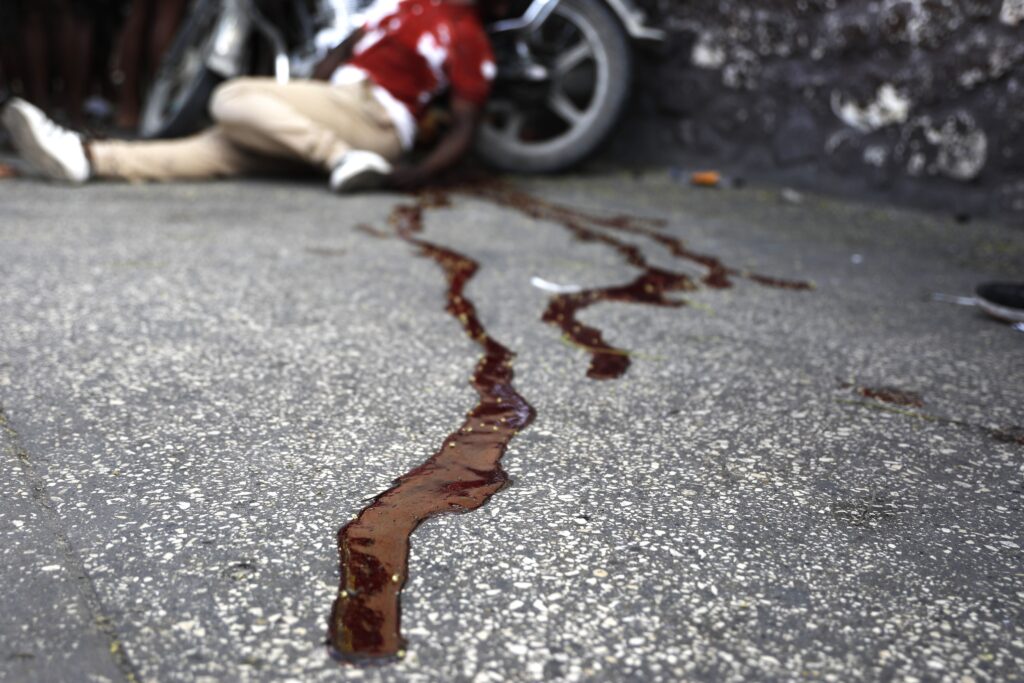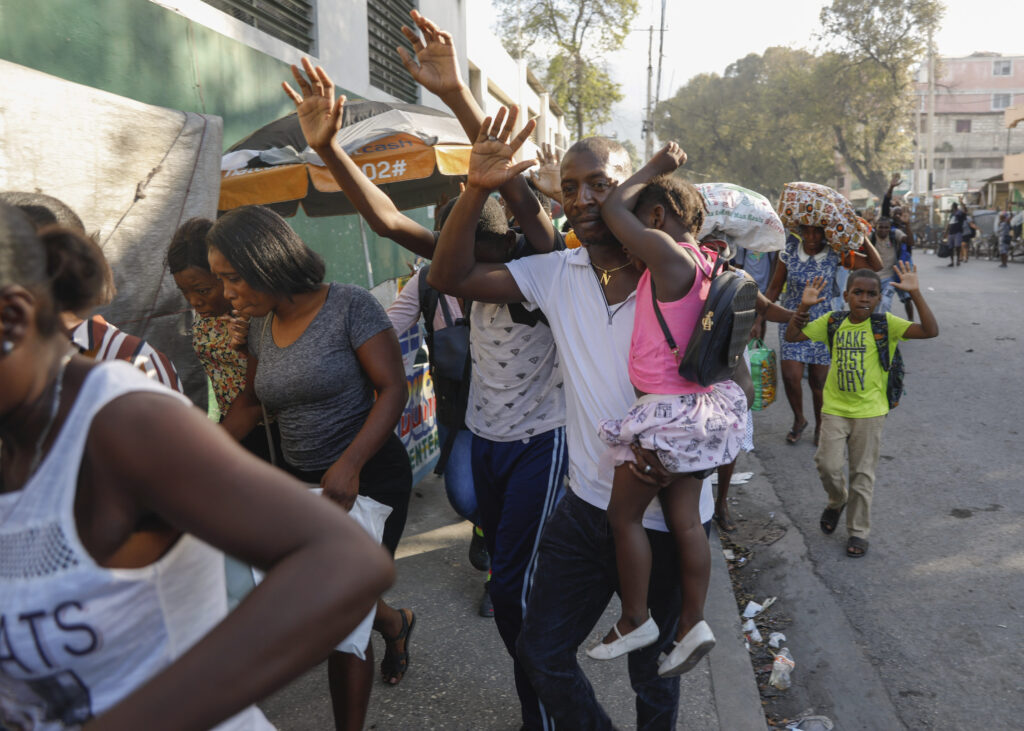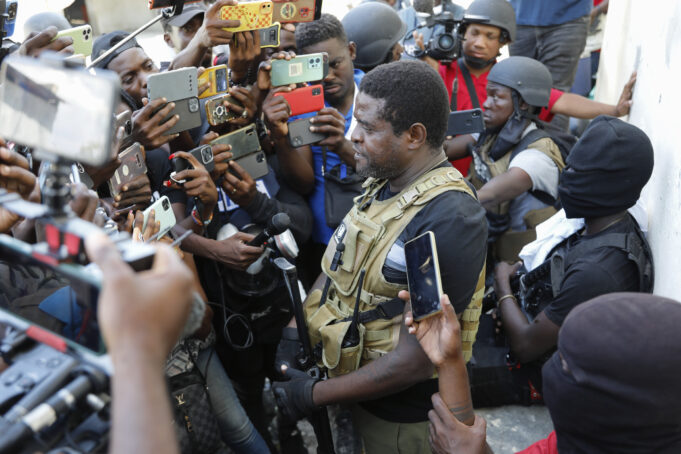“Corruption has appeared in the land and the sea, on account of what the hands of men have wrought”—Holy Quran 30:41
The world is reeling in turmoil beset with wars, bloodshed, active genocide, humanitarian crises, and gut-wrenching suffering. Among those experiencing extreme distress are the people of Haiti where political and economic insecurity, coupled with incessant violence has gripped the Caribbean nation of 11.4 million people.
An International Organization for Migration (IOM) report issued March 9 on the current situation said its latest displacement tracking shows 15,000 people have been displaced since a spate of political violence broke out Feb. 29.
All of them already experienced dislocation and were from 10 displacement sites that were fully evacuated due to the successive waves of violence. By presstime, more than 160,000 people are currently displaced in the Port-au-Prince metropolitan area.

“Haitians are unable to lead a decent life. They are living in fear, and every day, every hour this situation carries on, the trauma gets worse,” said Philippe Branchat IOM’s Chief in Haiti, underscoring the gravity of the situation.
“Insecurity is growing at the national level: violence in Artibonite, roadblocks in Cap Haitien, and fuel shortages in the South. People living in the capital are locked in, they have nowhere to go. People fleeing cannot reach family members and friends in the rest of the country to find shelter. The capital is surrounded by armed groups and danger. It is a city under siege,” he said in a statement.
Across Haiti, 362,000 people are currently internally displaced, some of them several times over increased household vulnerability. The IOM stated this represents a 15 percent increase since the beginning of the year. More than half of them, 180,000, are children, a group particularly vulnerable. The lack of goods and resources is amplifying an already precarious economic situation. Lack of access to water and basic services is raising stress and anxiety.
Political violence and upheaval
The violence erupted in numerous areas of the capital, Port-au-Prince, by politically connected “gangs” seeking to depose Haiti’s foreign-imposed Prime Minister Ariel Henry, who assumed office after the brutal assassination of Haiti’s President Jovenel Moise in 2021.

In the mayhem, Haiti’s port and international airport were seized, shops and police stations were torched, and prisons were stormed allowing approximately 4,500 inmates to escape. The havoc heightened insecurity, fear and uncertainty among the Haitian people and an initial three-day-long state of emergency has been extended through April 3.
The uprising started while Mr. Henry was abroad in Nairobi, Kenya solidifying an unpopular deployment of 1,000 Kenyan police to Haiti under the guise of helping Haiti’s National Police combat “gangs” and violence. The deployment, however, has been tabled for now.
Mr. Henry announced his resignation in a March 12 video from Puerto Rico where he was forced to go when the armed groups barred his plane from re-entering Haiti. They threatened civil war if he returned.
The embattled leader said his resignation is effective upon the formulation of a Transitional Presidential Council and a chosen interim president. A transitional initiative was brokered in Kingston, Jamaica by the regional Caribbean Community (CARICOM) in the presence of selected Haitian stakeholders and the United States represented by Secretary of State Antony Blinken on March 11.
“The government that I’m running cannot remain insensitive in front of this situation. There is no sacrifice that is too big for our country,” Mr. Henry said. “The government I’m running will remove itself immediately after the installation of the council.”
The council will be responsible for choosing an interim prime minister and a council of ministers, as well as helping organize general elections, which haven’t been held in nearly a decade. In addition, a mandatory stipulation for membership on the council is co-signing the multinational intervention force on Haitian soil.
Everyone is not in agreement as some political parties rejected the plan as another predominately non-Haitian effort injecting itself into Haitian affairs.
Prominent in the anti-Henry sentiment is Jimmy Chérizier, also known by the moniker “Barbeque,” leader of the “Revolution Forces of the G-9 Family and Allies,” a federation of armed neighborhood organizations in the center of the current disorder.
A former law enforcement officer, Mr. Chérizier has been an opponent of the U.S. installed leader and sought to overthrow Mr. Henry and flatly rejected the CARICOM proposal. “We take this opportunity to say to the international community that if it continues down this path, we will plunge Haiti into chaos,” warned Mr. Chérizier.
He condemned what he described as the international community choosing a small group of politicians to negotiate with on paper and decide who can be president and what kind of government Haiti would have.
“Today it’s clear that it’s the inhabitants of the working-class districts and the Haitian people who know what they’re suffering at the moment, and it’s up to them to choose the person who’s going to lead them and the way he’s going to lead them,” argued Mr. Chérizier.
Assessing Haiti’s crisis
Meanwhile, the volatile circumstances are giving expression to the dire social condition some Haitians are feeling.
For Joyselyn McCalla of the Haitian American Foundation of Democracy, Haiti is suffering in a situation where many Haitians are wading through muddy swamps of hopelessness, especially in areas like the capital Port Au-Prince where armed groups have increased their influence and control. He told The Final Call when you look at those involved in the violence, it’s basically young people in their 20s.
“These are essentially, folks, many of them quite young,” said Mr. McCalla, “who see no stake in the future of the country,” he added. Until that level of despair is reversed, conditions won’t really change.
“The challenge for Haiti is it got to rebuild from the bottom up,” Mr. McCalla reasoned. “So there needs to be a common understanding of what the future is going to be in Haiti, for people to embrace it, to have a vested interest in making sure that things are okay. And that everybody can sort of live together in a very difficult situation,” he said.
Haiti is more impoverished than it has been in a long time. The economy is in shambles and people are living off remittances from abroad when they can get them and essentially existing on a day-to-day basis. At the same time, a huge number of healthcare and educational institutions are dysfunctional, not having access to supplies.
Teachers are leaving in large numbers, because they can’t make a living teaching in those schools. There is a catastrophic situation, particularly over the last two and a half years, that Mr. McCalla said the U.S. has “unfortunately” backed.
Mr. McCalla contends for Haiti to have a fair chance, there must be a vision of the future that all can agree on beyond the questions of immediate leadership or searches being put in place to ensure some sort of peaceful, democratic give and take, with the support of the international community. But people must have a common way to develop that common vision.
“That’s why I say, build from the bottom up. It’s gonna require a lot of determination … steal nerves, so to speak, in order to address that situation,” he said.
Haiti, a matter of imperialism
Whilst the common perception of Haiti is a failed state too inept for self-governance, Haiti watchers say it is actually a vassal state exploited by foreign meddlers and internal collaborators. They argue that half the story is never really told.
The problem of Haiti, the first Black republic that rose from slavery to liberation and sovereignty, is the problem of endless interference by foreign powers. The root, branch, and fruit of the crisis are Western powers, chiefly the United States, an international snooper extraordinaire and geopolitical gangster.
“Haiti’s politics is very tricky,” said Joseph Makhandal, attorney and Nation of Islam coordinator for Haiti. “There’s a lot of trickery going on and corruption,” he said.
Foreign interests have a grip on Haiti’s social, economic and political life. “The U.S. policy in particular has been a policy of not to help Haiti, but a policy to pretend helping Haiti,” added Mr. Makhandal.
The U.S. modus operandi has been to create the problem, facilitate it, sometimes exacerbate existing problems, and then step in like a fixer afterward. “There is no interest in allowing Haitians to solve Haitian problems,” said Mr. Makhandal.
“Because Haitian problems are not really Haitian problems. They are problems that are manufactured and created by the powers that be,” he said. “In their perspective, it is a policy, to us it is a problem,” he stated.
“So why should they solve … eradicate … cancel out the very policy they wish to impose on Haiti, which is complete chaos and statelessness, a failed state where no institutions exist, no rule of law.”
Despite Haiti’s David vs. Goliath scenario with major powers, Mr. Makhandal works with the Haitian people to lessen the burden through the Konbit Ranpli Tat Bati Moun (Operation Self Improvement for People’s Development) organization and the Respect For Life Foundation.
For other observers, the current crisis is rooted in Washington’s sordid history of meddling in Haitian affairs.
“When we look at the history of occupations of Haiti over the years, going back to the U.S. occupation starting in 1915 and 1933, it’s always the same story,” said Eugene Puryear, an investigative journalist and commentator.
Mr. Puryear said the playbook is consistent where the discussion is always how Haiti is “totally out of control,” replete with disparaging names to boot. In 1915, “they called them bandits” and in 2024, “they call them gangs” to set the stage for justification for intervention.
“Even during the coup against (Jean-Bertrand) Aristide in 2004,” Mr. Puryear noted, “they concocted this totally fake story about paramilitary assassination squads” being controlled by Aristide … when the opposite was true,” he said. “So, I think we have to keep that in context.”
The investigative journalist said whatever challenges and problems there are confronting the people of Haiti, the negative image is deliberate. It is “To say the only way this can be solved is from the outside, and in a typical sort of racist way of imperialism; that there’s no way these Haitians, these Blacks can really get it together,” said Mr. Puryear.
However, since 2018 Haiti has engaged in huge mass movements of protest against President Moise and then Prime Minister Henry respectively. There were multiple civil society organizations and political parties that presented different roadmaps and ideas to advance Haiti forward.
“When you talk to the Haitian people, and I had the opportunity to travel there in 2021, you can see that Haitian people have the solutions for their own problems,” said Mr. Puryear. “They understand that their own poverty and underdevelopment is a direct result of U.S. government policy to keep Haiti as a place of very cheap labor and resource extraction,” he said.
The negative image of Haiti is designed to hide the fact that there are many “Haitian solutions to Haitian problems,” and “make sure that a Haitian popular movement, that would upset the applecart of neocolonialism could never come to power,” reasoned Mr. Puryear.
Haitians want self-determination and an end to external control, and their resources to benefit them. They want foreign companies in Haiti to pay decent wages and provide decent benefits. They want a political system that isn’t totally controlled by corrupt elites. “But of course, this whole state of affairs is what the West wants,” said Mr. Puryear.
For decades, the Honorable Minister Louis Farrakhan of the Nation of Islam expressed concern about suffering oppressed people worldwide, the plight of the Haitian people, and Haiti’s right to self-determination. The Minister and a Nation of Islam visited the island nation several years ago.
When asked his thoughts about Haiti during a press briefing with members of the International Media (World Press Corps) in 1996 the Minister said in part that “it seems that ever since Toussaint L’Ouverture and Jean-Jacques Dessalines beat Napoleon, Haiti has never been allowed to come out from under Western domination and humiliation.”
During that same interview, he said that the island nation “will probably continue to suffer until there arises among the masses that kind of Knowledge, Wisdom and Understanding that will unite the masses, that they may throw off the yoke of imperialism, colonialism, slavery and dependence that has so weakened and destroyed that beautiful nation.”
The Minister and his teacher, the Most Honorable Elijah Muhammad, had given clarity to the persistent intrusion of Washington in the affairs of other nations. Both men warned it is rooted in corruption and greed.
“There is no doubt in anyone’s mind today that the condition of the nations is such that needs a ruler who is not involved in the present world of corruption to bring about peace and good will among the people of the earth,” the Honorable Elijah Muhammad wrote in his pivotal book “Message To The Blackman in America.”
“There cannot be peace for the lovers who seek after peace until the peace breakers have been removed from authority and their activities of mischief making, causing bloodshed, grief, sorrow and trouble among peace-loving nations,” he continued.
“There is not a civilized government of people at this writing that is not in trouble and trying to find a solution to the cause. All the nations of the earth are so corrupt with other than good that they cannot come to any agreement on peace with each other, then carry it into practice,” wrote the Honorable Elijah Muhammad.













